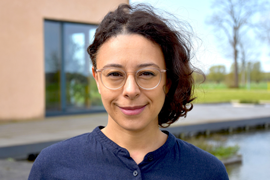Minister Manja Schüle visits Fraunhofer Center for Digital Diagnostics ZDD in the Potsdam Science Park
Digital Diagnostics in Rural Areas
Science Minister Dr. Manja Schüle visited Fraunhofer IZI-BB, the division for Bioanalytics and Bioprocesses of the Fraunhofer Institute for Cell Therapy and Immunology, to learn about the current research of the Fraunhofer Center for Digital Diagnostics ZDD®.


Potsdam, 09.07.2024 - The institute’s director, Prof. Dr. Antje Baeumner, and the deputy director, Dr. Eva Ehrentreich-Förster welcomed Brandenburg's minister of Science Dr. Manja Schüle. During the visit, the hosts presented the vision of the Fraunhofer ZDD® and the strategic direction of the institute. The goal of Fraunhofer ZDD® is to develop solutions, technologies, and services to enable digital diagnostic-supported healthcare in rural areas. The minister was informed about projects such as the Digital Villages, chronic diseases, and the challenges and solutions in sample collection and preparation on-site.
Science Minister Dr. Manja Schüle said, “Powerful, flexible diagnostics will be coming from Brandenburg: With the Fraunhofer Center for Digital Diagnostics ZDD in Golm, new models for the future challenges of our healthcare system are being tested – extremely important in a state like Brandenburg. And perfectly fitting with the newly founded Medical University of Lusatia – Carl Thiem, which will combine care, teaching, and research with a focus on health system research and digitalization in healthcare. This benefits not only our research state of Brandenburg but primarily patients, who will be better treated and cared for. Win-win at its best!”
Prof. Dr. Antje Baeumner commented, “The combination of on-site analytics, intelligent data evaluation, and networked data communication has the potential to fundamentally transform healthcare – especially for the population in rural regions. The Fraunhofer ZDD® is currently developing technical solutions that enable seamless networking of various healthcare actors. Medical staff can then be relieved while maintaining on-site diagnostics and care. For example, we are working on an intelligent wound dressing that promises faster and more effective healing of chronic wounds. Soon model communities in Brandenburg will test these innovations, gradually followed by further regions. A progress that not only brings hope but also has the potential to improve medical care sustainably.”
Further projects of the Fraunhofer IZI-BB were demonstrated in the laboratory, including the use of organ-on-a-chip systems as an alternative to animal testing and future technology for personalized medicine. Research in this field offers insights into therapies that could help at home monitoring after a hospital stay. Dr. Manja Schüle, who had advocated for establishing the Fraunhofer ZDD®, was impressed by the innovative power of the ongoing research projects at Fraunhofer IZI-BB.
 Fraunhofer Institute for Cell Therapy and Immunology, Branch Bioanalytics and Bioprocesses IZI-BB
Fraunhofer Institute for Cell Therapy and Immunology, Branch Bioanalytics and Bioprocesses IZI-BB